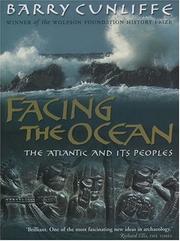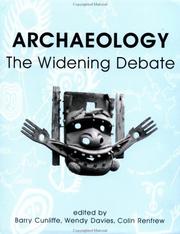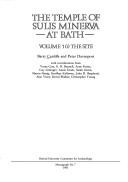| Listing 1 - 10 of 11 | << page >> |
Sort by
|
Book
ISBN: 050039007X 0500270155 Year: 1971 Publisher: London ; New York, NY : Thames & Hudson,
Abstract | Keywords | Export | Availability | Bookmark
 Loading...
Loading...Choose an application
- Reference Manager
- EndNote
- RefWorks (Direct export to RefWorks)
Fishbourne, England --- Antiquities, Roman --- Palaces --- -Romans --- -Ethnology --- Italic peoples --- Latini (Italic people) --- Buildings --- Fishbourne (West Sussex, England) --- -Antiquities, Roman --- Sussex --- Romans --- Fishbourne --- Ancient Roman antiquities --- Fishbourne, Sussex --- Antiquities, Roman. --- -Fishbourne (West Sussex, England) --- Ancient Roman antiquities. --- Ethnology

ISBN: 0192853554 Year: 2004 Publisher: Oxford ; New York, NY : Oxford University Press,
Abstract | Keywords | Export | Availability | Bookmark
 Loading...
Loading...Choose an application
- Reference Manager
- EndNote
- RefWorks (Direct export to RefWorks)
Civilisation celtique --- Atlantique (region) --- Civilisation

ISBN: 0197262554 9780197262559 Year: 2002 Publisher: Oxford [etc.] : Oxford University Press,
Abstract | Keywords | Export | Availability | Bookmark
 Loading...
Loading...Choose an application
- Reference Manager
- EndNote
- RefWorks (Direct export to RefWorks)
Archaeology --- Archéologie --- Methodology --- Méthodologie --- Civilisation universelle --- Civilisations --- Héritage culturel --- Civilization
Book
ISBN: 9780198820123 0198820127 9780198820130 Year: 2019 Publisher: Oxford ; New York (N.Y.) : Oxford University Press,
Abstract | Keywords | Export | Availability | Bookmark
 Loading...
Loading...Choose an application
- Reference Manager
- EndNote
- RefWorks (Direct export to RefWorks)
Brilliant horsemen and great fighters, the Scythians were nomadic horsemen who ranged wide across the grasslands of the Asian steppe from the Altai mountains in the east to the Great Hungarian Plain in the first millennium BC.-- [tiré de la jaquette]
Scythes --- Antiquités scythes. --- Histoire. --- HISTORY / Europe / Eastern. --- Scythians --- Scythians. --- Skythen. --- History.
Book
Year: 1973 Publisher: Duckworth,
Abstract | Keywords | Export | Availability | Bookmark
 Loading...
Loading...Choose an application
- Reference Manager
- EndNote
- RefWorks (Direct export to RefWorks)
Book
Year: 1971 Publisher: London : Routledge and Kegan Paul,
Abstract | Keywords | Export | Availability | Bookmark
 Loading...
Loading...Choose an application
- Reference Manager
- EndNote
- RefWorks (Direct export to RefWorks)
Book
ISBN: 0904531465 9780904531466 Year: 1976 Volume: 11 Publisher: Oxford : BAR (British Archaeological Reports),
Abstract | Keywords | Export | Availability | Bookmark
 Loading...
Loading...Choose an application
- Reference Manager
- EndNote
- RefWorks (Direct export to RefWorks)
Iron age --- Urbanization --- Age du fer --- Urbanisation --- Congresses --- Congrès --- Europe --- Antiquities --- Antiquités --- -Urbanization --- -Europe --- -#BIBC:bibl.Reekmans --- Cities and towns, Movement to --- Urban development --- Urban systems --- Cities and towns --- Social history --- Sociology, Rural --- Sociology, Urban --- Urban policy --- Rural-urban migration --- Civilization --- -Congresses --- Congresses. --- Congrès --- Antiquités --- #BIBC:bibl.Reekmans --- Council of Europe countries --- Eastern Hemisphere --- Eurasia --- Iron age - Europe - Congresses --- Urbanization - Europe - Congresses --- Europe - Antiquities - Congresses

ISBN: 0947816070 Year: 1985 Publisher: Oxford : University of Oxford, Committee for Archaeology,
Abstract | Keywords | Export | Availability | Bookmark
 Loading...
Loading...Choose an application
- Reference Manager
- EndNote
- RefWorks (Direct export to RefWorks)
Book
ISBN: 9781789250886 1789250889 Year: 2019 Publisher: Oxford ; Philadelphia : Oxbow books,
Abstract | Keywords | Export | Availability | Bookmark
 Loading...
Loading...Choose an application
- Reference Manager
- EndNote
- RefWorks (Direct export to RefWorks)
This book is the fruit of collaborative work by researchers in archaeology, historical linguistics, and archaeogenetics over the past ten years. This team works towards the goal of a better understanding of the background in the Bronze Age and Beaker Period of the people who emerge as Celts and speakers of Celtic languages documented in the Iron Age and later times. Led by Sir Barry Cunliffe and John Koch, the contributors present multidisciplinary chapters in a lively user-friendly style, aimed at accessibility for workers in the other fields, as well as general readers. The collection stands as a pause to reflect on ways forward at the moment of intellectual history when the genome-wide sequencing of ancient DNA (a.k.a. 'the archaeogenetic revolution') has suddenly changed everything in the study of later European prehistory. How do we deal with what appears to be an irreversible breach in the barrier between science and the humanities?
Book
Year: 1964 Publisher: Winchester : Museums and libraries committee,
Abstract | Keywords | Export | Availability | Bookmark
 Loading...
Loading...Choose an application
- Reference Manager
- EndNote
- RefWorks (Direct export to RefWorks)
| Listing 1 - 10 of 11 | << page >> |
Sort by
|

 Search
Search Feedback
Feedback About UniCat
About UniCat  Help
Help News
News